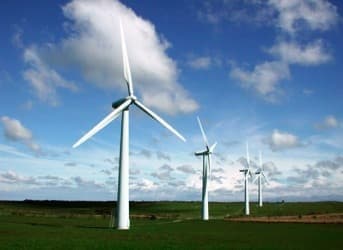As Mitt Romney and Barack Obama intensify the showdown over tax breaks for wind energy, the US state of Iowa, home to a significant proportion of US energy jobs, is the key battle venue.
The heart of the issue is the wind production tax credit, the aim of which is to strengthen the market for turbines and towers. The credit will expire at the end of the year unless Congress acts to extend it.
The black-and-white breakdown of the issue is that proponents of the tax breaks fear that in the absence of these breaks, the jobs will disappear, while critics say taxpayers can’t afford the $1.6 billion these tax breaks will cost this year alone.
Iowa has more wind energy jobs than any other US state, so naturally this is where the Obama campaign is taking its argument, where it will resonate as one of the focal points of the election.
Romney is in a tough spot on this one, particularly since he does not have Republican support across the board on the issue. Specifically, he does not have the support of Iowa’s GOP leaders, including Republican Governor Terry Branstad. Nor does he have the support of the congressional delegation. Both want the tax break for wind energy and both see it as crucial to Iowa’s economy, while some even think it is crucial to wind energy development nationwide.
This is how things went down in Iowa, which is indicative of Romney’s tricky position:
Romney’s campaign spokesman in Iowa told local media that Romney would allow the tax credit to expire, referring to it flippantly as the “stimulus boondoggles”, and would force the wind energy sector to compete on a level, subsidy-free playing field.
Rep. Tom Latham then responded by suggesting that Romney didn’t fully understand the importance of the wind energy tax, not only to Iowa but to the entire nation.
Romney, of course, doesn’t really care too much about wind energy tax breaks. This is electioneering and he chose this political battle based on the notion that it would be an easy win, especially in the aftermath of perceived failures related to subsidies for the solar power sector and electric cars. It was an ill-conceived choice.
As far as predicting job loss, try as it might, the Obama campaign cannot give us any accurate assessment because no one really knows what will happen. Iowa is nervous because it employs as many as 7,000 people in the wind energy sector. Critics of the wind energy credit would be quick to point out that the tax credit only directly affects wind farm builders and operators, but manufacturing jobs would also be affected by the obvious indirect connection. Here, too, Iowa is on edge, with five major wind energy equipment manufacturers employing as many as 2,300 people.
A poll conducted by Public Opinion Strategies’ Glen Bolger on behalf of the American Wind Energy Association shows that 57% percent of voters are less likely to support a candidate who has no intention of supporting wind energy development. That figure includes 41% GOP voters.
At the same time, critics of the tax break for wind energy duly note that removing the tax break would not affect existing wind projects—only new projects.
MidAmerican Energy, a major beneficiary in the wind energy tax break scheme, says the removal of the tax break would not affect its work force.
The real question is: Can the wind energy sector survive without subsidies?
The Romney campaign things wind energy will do well without subsidies as long as it is economically viable—which it would have to be on its own merits. The bottom line is that subsidies were never meant to last forever and at some point, the wind energy sector will have to become competitive without subsidies. The point of subsidies is to give wind energy a chance to compete on a more level playing field. Has it reached that point? Well, those who receive subsidies will always argue that that point has not been reached. Europe’s solar industry is a case in point, and now that the dust has settled on a post-subsidy era, there are strong indications that the industry will rebound. It must be more creative and innovative if it’s going to compete, but things aren’t looking too bad.
ADVERTISEMENT
In the end, it’s all about balance and while the wind energy sector should be prepared to enter a competitive market at some point in the very near future, the ideal situation would be a phase-out that would take place over the course of a couple of years, giving the industry time to adjust. Certainly, an end to the tax breaks would hinder new development in the short-term, but if the industry is innovative enough, development will bounce back naturally.
John Hoeven (R-N.D.) does not support abruptly cutting off the wind energy sector from incentives; rather, he would opt for a phase-out towards a market-based approach. “I think we are going to a market-based approach, that is where it is going, the question is how do you get there. So there are some differences in how we get there, but I think we are going to end up ... in the same place,” he said.
Back to the politics, though, Iowa is not ready to take the risk, especially with billions in additional wind farms planned for the state. It’s this fear that the Obama campaign is banking on, and this fear that will ensure Romney hit and miss on the issue, even among some of his fellow republicans.
By. Charles Kennedy for Oilprice.com


















